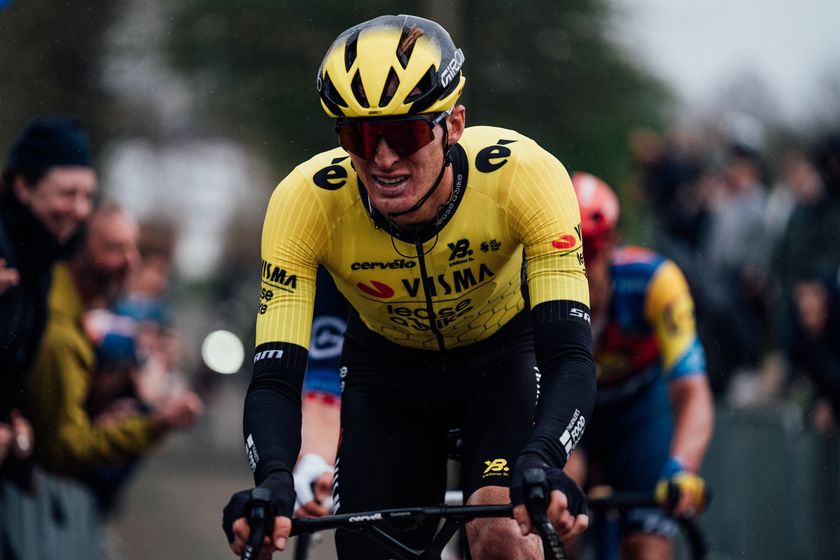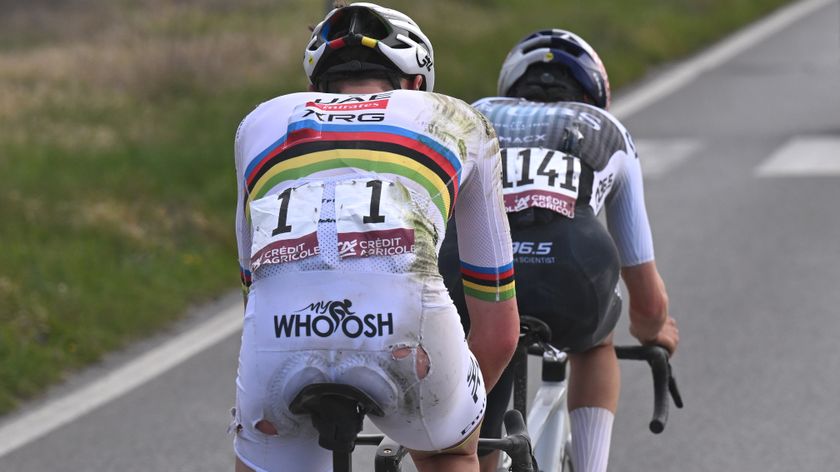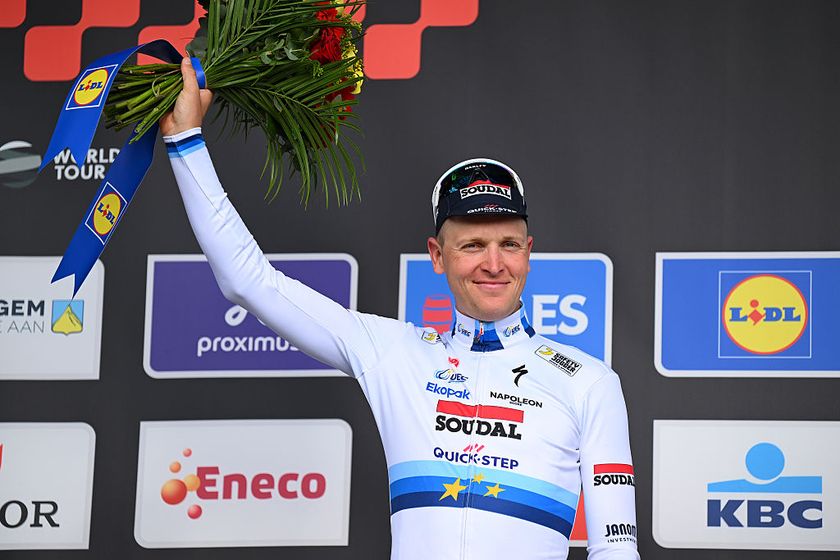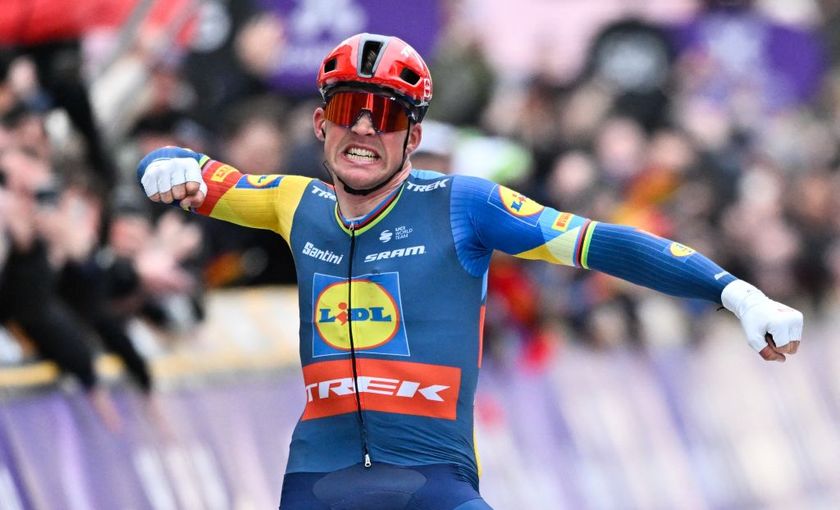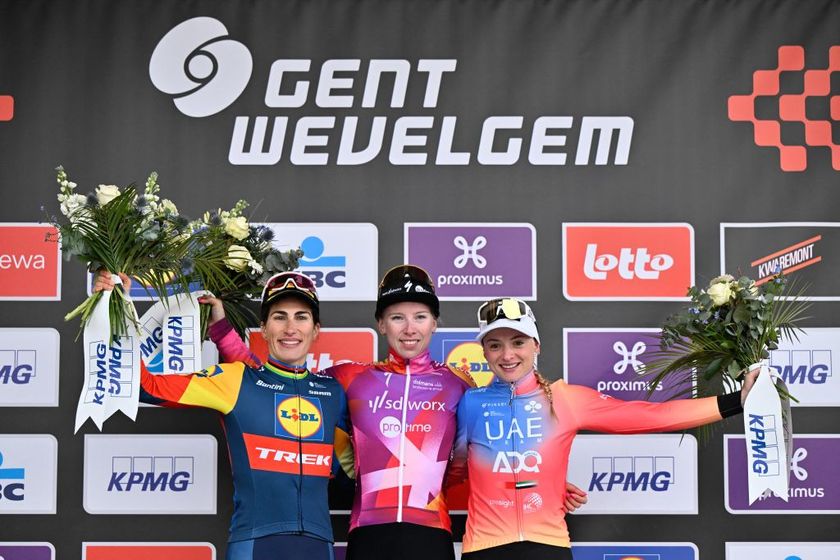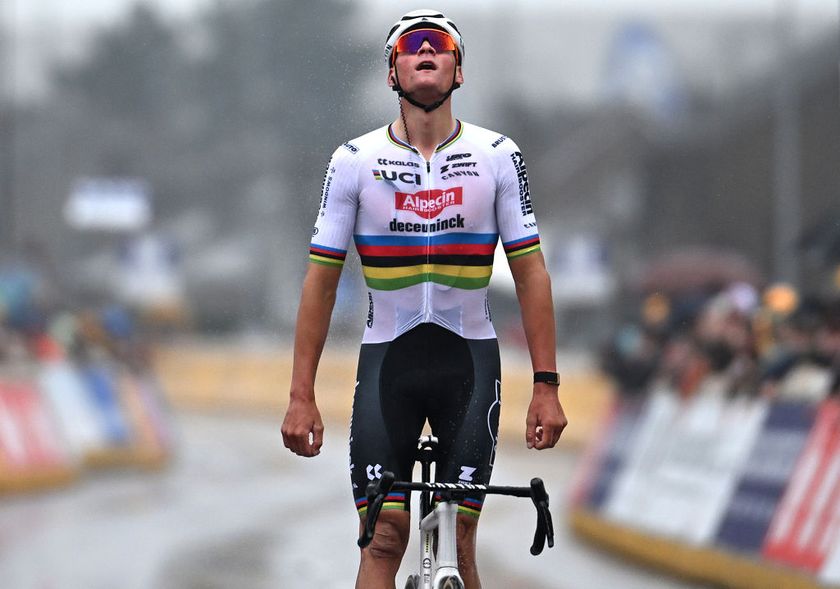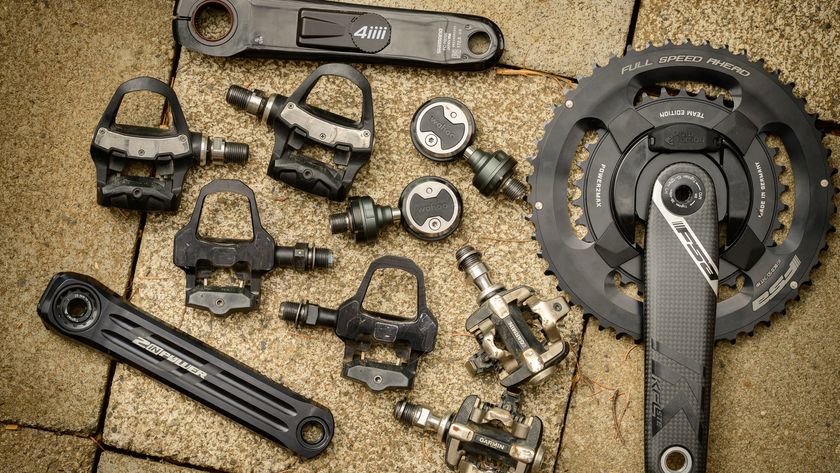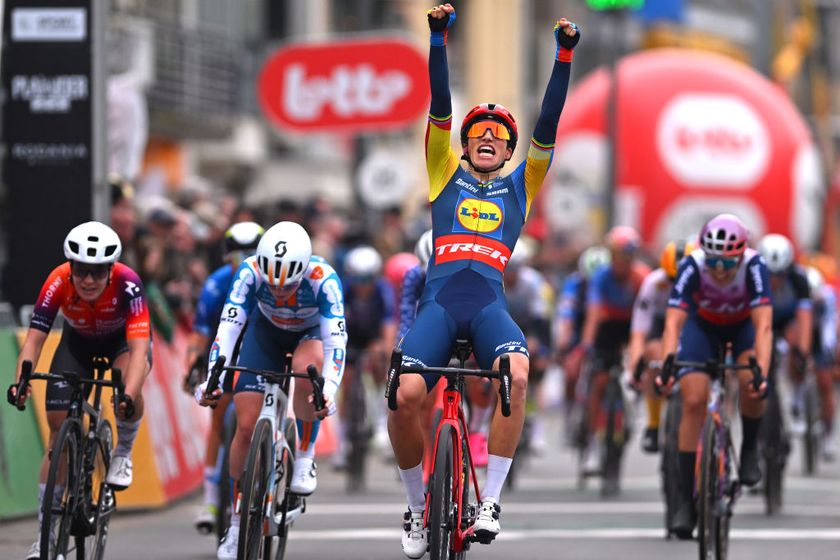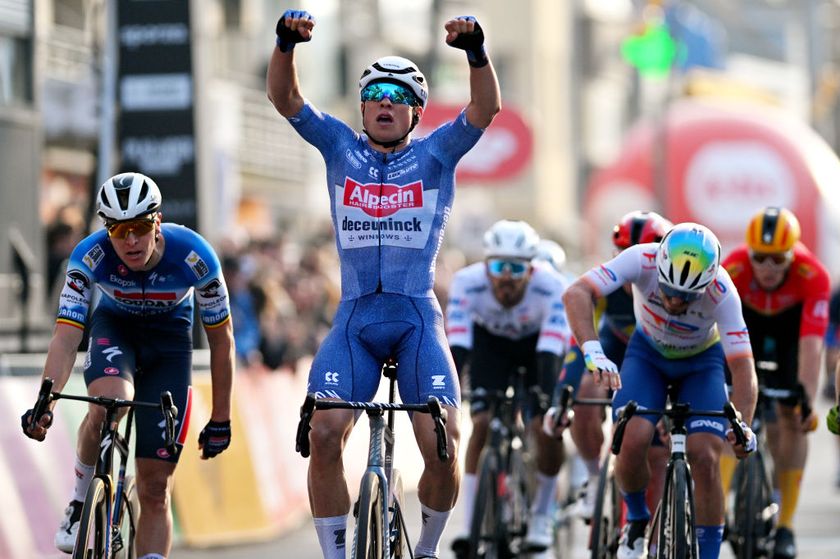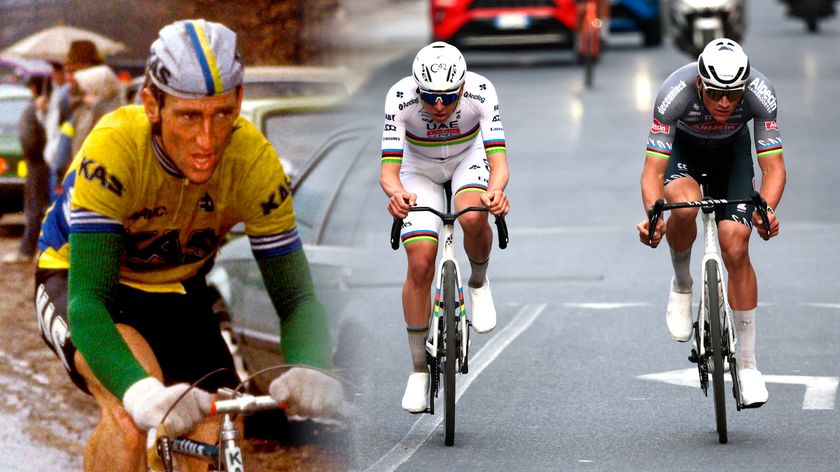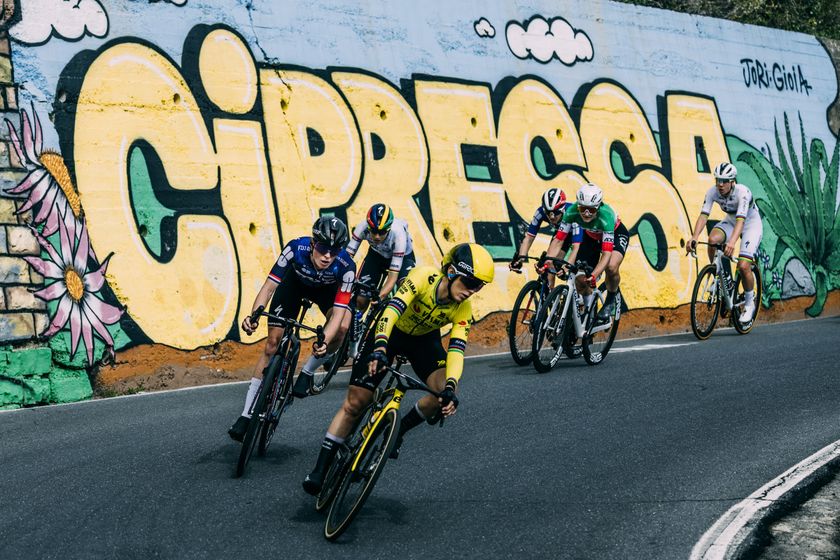'I'll keep on racing as long as I have fun' - A candid discussion with Primoz Roglic
Slovenian talks about the 2023 Giro d'Italia, what happened at the Vuelta a Espana and his ambitions for the 2024 Tour de France
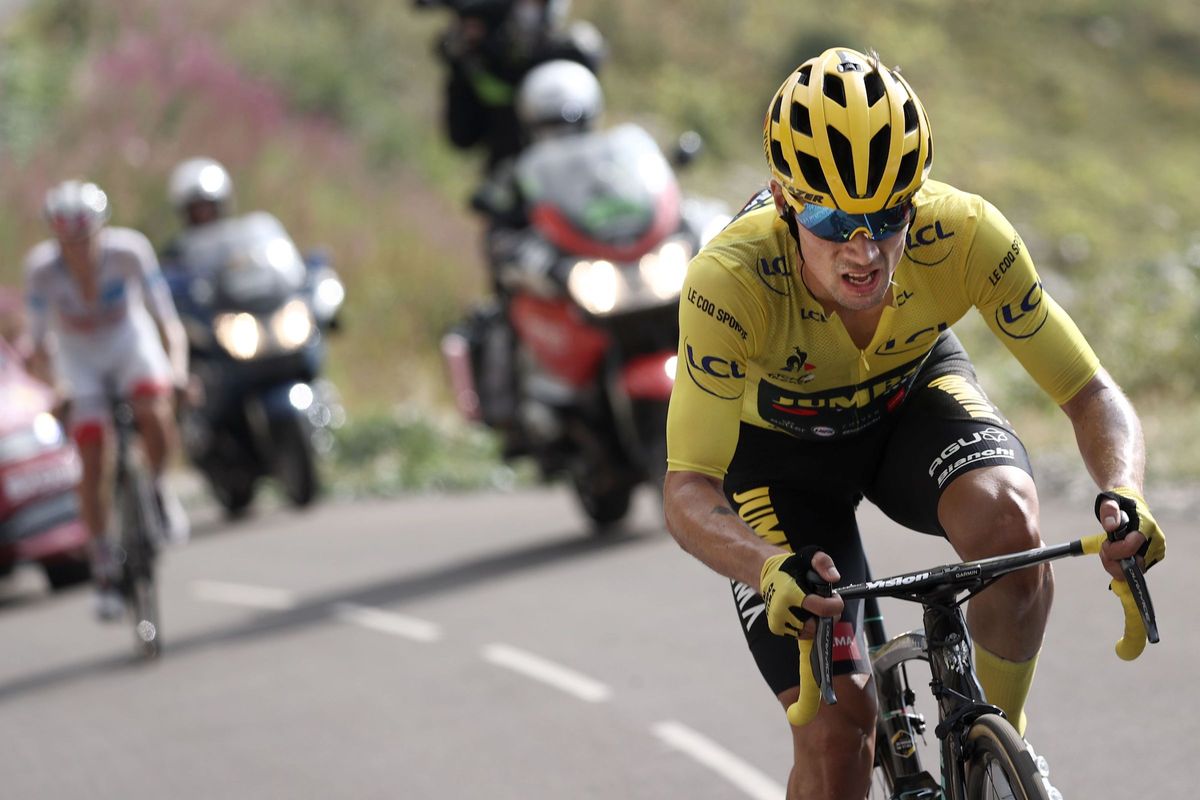

Primož Roglič has spoken openly about his racing career, his unique philosophy on life, his 2024 Tour de France ambitions and why he was happy to help Sepp Kuss win the 2023 Vuelta a España despite his own ambitions.
Roglič is usually a man of few words, but during an hour-long conversation in front of an audience of 300 guests and cycling fans at the Gazzetta dello Sport Festival dello Sport in Trento, Roglič’s true character emerged. Cyclingnews was there too.
He is an ambitious professional cyclist but also reflective on the way he approaches life, his youth as a ski jumper, forming the foundations of his cycling career.
Roglič appeared relaxed and happy as he sat on stage in Trento, after arguably his best-ever season. He won the Giro d’Italia in May and every stage race he rode during the season, except for the Vuelta a España.
The Slovenian was 33 when he won the Giro d’Italia in May, and he is competing against a new generation of talented riders that are a decade younger. Yet Roglič does not feel his age and is confident he can continue to be successful in Grand Tours.
“I started cycling late and so don’t really care about counting the years. When you have the possibility to achieve the things you dream of, you have to do it as long as you like it,” Roglič suggested as he calmly answered questions from former Italian rider Davide Cassani and Gazzetta dello Sport journalist Nino Morici.
Get The Leadout Newsletter
The latest race content, interviews, features, reviews and expert buying guides, direct to your inbox!
“I'll keep on racing as long as I have fun. Now, I enjoy it and have fun being who I am in the world of cycling. When I realise I want to do other things in life, I’ll make space for the young guys who are coming up quickly.”
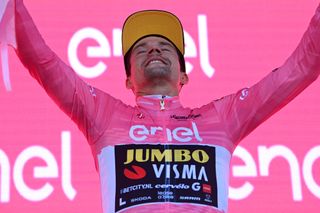
Roglič's transformation from a ski jumper to a Grand Tour winner is well known. He sold a motorbike to buy his first race bike and took part in Italian Gran Fondo rides before his first real races. He convinced the Adria Mobile Continental team to give him a chance in 2013 and only signed his first professional contract in 2016 when Jumbo-Visma were convinced he had some special talents.
Roglič spent 15 years as a talented ski jumper, from the age of seven to 22, giving him a unique outlook on life and elite sport.
“When I was 22 and not an Olympic champion and not the best of the best that I dreamt of being as a kid, I realised it was perhaps the last chance to change sports. I felt cycling could be something for me, and that’s why I went for it,” Roglič said, explaining his transformation from a ski jumper into a cyclist.
“Ski jumping is a completely different sport; it ends in a couple of seconds, while bike racing lasts hours and hours. But it gave me a lot; we used meditation and visualisation techniques, and we were taught all kinds of aspects of ski jumping, which helped me as a rider.
“For sure, I didn’t have the endurance, but I had other small skills that helped me, and then I learnt quite fast. I didn’t know how it would go, but I knew what I wanted to be and kept fighting. That’s what I focused on.
“My cycling career then developed step by step, maybe fast steps, but step by step. In 2017, I won the Volta ao Algarve and then the first WorldTour race. Then, the 2019 Giro d’Italia was the first time I was a team captain and tried to win a Grand Tour.
“I didn’t know that I could be such a good time trialist, and I missed out on winning the first stage, and so the maglia rosa by a tenth of a second to Tom Dumoulin. But I decided I wanted to win the second time trial even if I’d never actually ridden a time trial over 40km. We decided to go for it, and it was my first Grand Tour stage win.”
The details that helped Roglič win the 2023 Giro d'Italia
Since 2019, Roglič has won the Vuelta a España three times, the Giro d’Italia in 2023 and numerous other WorldTour stage races. Only the Tour de France eludes him due to crashes and that terrible defeat in the Planches des Belles Filles time trial to Tadej Pogačar in 2020.
British journalist Dan Friebe coined the phrase ‘Rogličation’ to describe how Roglič so often beats his rivals in uphill sprints thanks to his power, speed and dogged determination.
Yet on stage in Trento, Roglič was in a more reflective mood than at races. He pointed out how difficult moments in races rather than a victory are often the key to his success, especially in Grand Tours.
The most recent case was at the 2023 Giro d’Italia, not far from Trento, when João Almeida and Geraint Thomas dropped him on the long climb to the stage 16 mountain finish. He suffered all the way to the finish line, limiting his losses to 25 seconds.
“I finished third on the stage to Monte Bondone in the 2023 Giro, and that result was a personal victory,” Roglič recalled after seeing Monte Bondone overshadow Trento on his arrival in the city.
“I didn’t have the legs that day, but Grand Tour racing is not always about being first. It’s about giving a bit more in certain key moments. I did that on the stage on the Bondone so that I could still fight for overall victory in the big final stages.”
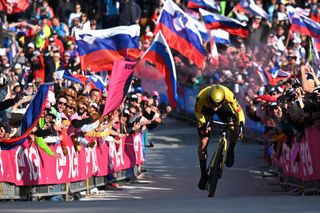
The time trial up Monte Lussari a few days later was also nerve-wracking for Roglič, but he survived again.
He started the 18.6km mountain time trial 26 seconds behind Geraint Thomas. He knew he had a chance of taking victory, but a dropped chain on the climb sparked sudden panic. Fortunately, he quickly got his chain back on, and a long push from an old friend who happened to be at the roadside helped him limit his losses.
An adrenaline rush combined with his now well-honed self-control helped him win the stage, and so the Giro d'Italia, by just 14 seconds ahead of Thomas.
“When you manage to be happy with and appreciate the small things, then you don’t need much. That’s how I approached the Giro,” Roglič explained.
“I was super happy I could give my all on that climb, which has a special meaning to me due to my ski jumping career because I won a junior world title there. The support of the people and then the crazy time trial was everything I could wish for.
“I had the mechanical, I didn’t want it, but we fixed it, and I still had enough to finish it off.”
Finding perspective from defeat
During the hour-long chat show format, Cassani also asked Roglič about his 2020 Tour de France defeat.
His disappointment was clear to see as he sat on the road in the moments after the stage. But three years on, Roglič has found a positive aspect to such a huge defeat.
“I was there to win and finish it off, so it was hard when I lost. But looking back, I have to be happy about it because afterwards, I won a lot of things,” he suggested.
“Maybe I could have won the Tour, but perhaps I wouldn’t have then won all that I did, so the 2020 Tour actually gave me a lot. It always depends on how you look at things in life. You can be disappointed, but always take some positives from it and look to the future. We can always create our own future.”

This year’s Vuelta a España is a more recent event with equally strong emotions.
Sepp Kuss emerged as the final winner, with Jonas Vingegaard second and Roglič third as Jumbo-Visma completed a historic 1-2-3 on the podium after also winning the Giro d’Italia and Tour de France.
We now know that Roglič was working on a move away from Jumbo-Visma to Bora-Hansgrohe at the time of the Vuelta a España and so perhaps wanted to win himself.
He attacked Kuss on the climb of the Angliru climb on stage 17, but then, after a huge public outcry on social media, he accepted a team decision that the American deserved to win.
Roglič let slip that "I have my own thoughts about it” immediately after the stage. In Trento, when Cassani asked him if he had ‘raced with the brakes on,’ Roglič revealed more about what happened in the final week of the Vuelta.
“I’ll talk straight,” he said. “In races, I’m there to win, and that’s my responsibility, to do my best.
“We came into a new situation for the team with us 1-2-3. Maybe by pushing myself more and more, I could have destroyed that picture, but you never know what could have happened.”
Roglič insisted he was happy that Kuss won the Vuelta a España.
“Cycling is a team sport, and I was the first one who was super happy because Sepp really deserved it. He was the best and never showed any weakness,” he said.
“It was crazy to be on the podium with the two guys who, in the past, grew up and learnt from being at my side and then becoming big champions. It was special to be a part of that story.”
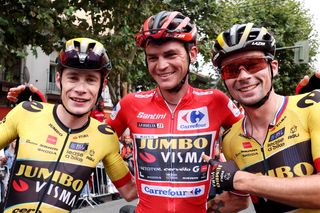
Two weeks after the Vuelta a España, Bora-Hansgrohe announced that Roglič would join the German team and spearhead their Tour de France ambitions in 2024. Roglič will reportedly earn €5 million per season.
Roglič will turn 34 on October 29, and winning the Tour de France is perhaps the only outstanding career objective.
“I know what is missing from my palmares,” Roglič let slip in Rome after winning the Giro d’Italia, first indicating that he wanted a clear shot at victory and not ride alongside Vingegaard or anyone else.
“I don’t want to say the Tour is an obsession,” Roglič said in Trento, trying to avoid any obsession about the Tour de France.
“I’ve won a lot, and so even if I stop immediately, I’m super proud of what I’ve won and what has happened. But it’s my responsibility to go for it, to try to do everything to win, to have no regrets and be proud of what happens.”


Stephen is one of the most experienced member of the Cyclingnews team, having reported on professional cycling since 1994. He has been Head of News at Cyclingnews since 2022, before which he held the position of European editor since 2012 and previously worked for Reuters, Shift Active Media, and CyclingWeekly, among other publications.
